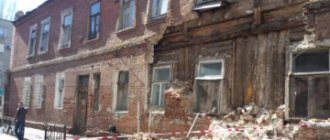Can an apartment in a non-emergency apartment building be recognized as unsafe, what does the law of the Russian Federation say?
In accordance with Article 15 of the Housing Code of the Russian Federation , residential premises may be declared unsuitable for habitation. The grounds and procedure for assigning the status of unfitness and accident are established by the Government of the Russian Federation.
State program for resettlement from dilapidated and emergency housing
Please note that if an apartment building is recognized as unsafe, then all residential premises in it will be unsafe. To confirm the emergency status, you do not need to run through authorities.
But if the apartment building is not in disrepair, then the apartment can still be considered dangerous and unfit for habitation, but this will need to be proven.
In addition, the classification of residential premises into one category or another is regulated by Articles 15 and 32 of the RF Housing Code.
Recognition procedure
How to recognize housing as dilapidated and unsafe? A house is declared unfit for habitation in accordance with Section IV of Resolution No. 47.
It is important to know: What is common property in an apartment building
1. Submission of documents and applications
To begin the procedure, you must submit an application.
In an apartment building, you can first hold a meeting of residents and vote on recognizing the building as unsafe (dilapidated).
Who can apply:
- tenant of the house (owner or social tenant);
- municipality;
- control authorities (Rospotrebnadzor, fire inspection, etc.).
Residents can apply:
- To the administration.
- Housing inspection (will issue an opinion and transfer it to the interdepartmental commission).
- Interdepartmental commission. To apply directly, additional costs will apply. It is necessary to order an inspection of the technical condition of an apartment building from a specialized organization. The organization will issue a conclusion, which is submitted to the commission
The interdepartmental commission makes a decision (clause 47 of resolution No. 47):
- about the suitability of the house for habitation;
- the need for major repairs, reconstruction or redevelopment;
- unsuitability of the house for habitation;
- recognition of an apartment building as unsafe and subject to reconstruction or demolition.
The acceptance period is 30 days (clause 46 of resolution No. 47). Draws up in the form of a conclusion
3. Issuance of an order
Based on the conclusion, the state authority (or local government) issues an order within 30 days indicating the timing of the relocation of residents (clause 49 of resolution No. 47)
Grounds for recognizing an apartment as unsafe in a non-emergency apartment building
An apartment or any residential premises may be considered unsafe if there are certain reasons. The grounds on which housing can be assigned this status are set out in Government Resolution No. 47, dated January 28, 2006.
So, here are the reasons for recognizing an apartment as unsafe:
- Presence of damage to load-bearing or enclosing structures.
- Lack of utilities, for example, centralized heating, water supply, electricity. Please note that if the elevator in your house does not function, this does not mean that the house will be in disrepair.
- There is no ventilation in the room.
- Adjacent ventilation - kitchens with living rooms, bathrooms, etc.
- The air temperature in the apartment is less than 18 degrees for a long period.
- Air humidity exceeds the minimum threshold of 60%.
- There is no insolation in the number of rooms established by the standards. For example, for one- to three-room apartments there is at least one room, for apartments of a larger area - at least two rooms.
- The apartment is located in the basement or on the ground floor.
- There are no windows in the kitchen or rooms.
- There are toxic substances in the room that are hazardous to health. They must be measured.
Of course, if there is a danger to human life and health, then the issue of obtaining status is resolved much faster.
Specialists included in the commission should also pay attention to factors confirming a high level of danger.
For example:
- Exceeding sanitary standards.
- The location of the house is on unstable ground.
- The location of the house on the path of landslides, mudflows or avalanches.
- The noise level is excessive.
What to do if neighbors are noisy - legal methods of dealing with noisy neighbors from the apartment above, below or next door - The house has damage caused by earthquakes, floods, and natural disasters.
Keep in mind that emergency and dilapidated housing has different statuses. It's not the same thing.
Dilapidated housing can be considered unfit for habitation only if its condition cannot be changed through the implementation of architectural and engineering solutions. In almost other cases, it may be considered suitable for habitation and use. The most common situation is carrying out major repairs in a dilapidated house or reconstruction.
Demolition of emergency housing - rights of the owner, terms of what they receive in return 2021
The procedure for demolition of emergency housing is regulated by the Housing Code of the Russian Federation and Government Decree No. 47 of January 28, 2006. Its compliance is mandatory.
Dear readers! The article talks about typical ways to resolve legal issues, but each case is individual. If you want to find out how to solve your particular problem , contact a consultant:
APPLICATIONS AND CALLS ARE ACCEPTED 24/7 and 7 days a week.
It's fast and FREE !
Violation of citizens' rights during the resettlement process can be appealed in court.
Signs of housing unsuitable for habitation are established by Government Decree No. 47 of January 28, 2006.
In accordance with this act, its distinctive characteristics are recognized as follows:
- the house has serious structural damage and deformations;
- the residential premises do not have some engineering systems, for example, there is no electricity or water supply;
- ventilation does not work properly, namely, it mixes the air from the kitchen and sanitary premises with the living rooms;
- in the house the air temperature remains at levels not exceeding 18 degrees for a long period of time;
- non-compliance with humidity standards, if they exceed the minimum threshold of 60%;
- lack of insolation, that is, the proper level of sunlight penetrating the windows in one or more rooms (standards depend on their total number);
- the location of the living space in the basement or on the 0th floor;
- lack of window openings;
- exceeding the normal content of toxic substances.
These grounds do not make it possible to recognize a residential premises as safe for the life and health of its residents.
The Housing Code of the Russian Federation regulates the procedure for demolishing a residential building. This codified act establishes the rights of residents living in it to be provided with housing.
Different procedures are provided for citizens who own a house by right of ownership and by social rent.
Thus, Article 32 of the Housing Code of the Russian Federation approves the procedure for owners, and Article 86 of the Housing Code of the Russian Federation - for those who have a social tenancy agreement:
- Paragraph 10 of Article 32 of the Housing Code of the Russian Federation establishes that if a house has been declared subject to demolition, the owners must be notified within a reasonable time of the need to carry out these actions. If the requirements of the competent authorities are ignored, the land plot is subject to seizure along with residential premises. In this case, the owners receive compensation according to the rules that apply when alienating a plot for state and municipal needs.
- Article 86 states that tenants under a social tenancy agreement must provide comfortable houses.
Is the owner entitled to compensation for emergency housing? Details here.
Objects are recognized as unsuitable in accordance with the procedure approved by the Government.
This rule applies to both owned houses and those owned by residents under a social tenancy agreement. In these cases, the legal consequences for the citizens themselves will differ.
Objects that have been found to contain harmful environmental factors that threaten the life and health of persons in them are subject to demolition.
The decision to declare housing unfit for habitation has the right to be made by specially created interdepartmental commissions:
- The residents themselves, who own the premises as property rights or occupy them under a social tenancy agreement, may be involved in their work.
- Specialists – engineers – will determine compliance or non-compliance with the stated standards.
- Designers are able to give an objective assessment of the building and correctly document the degree of wear and tear.
- Additionally, narrow specialists may be involved - representatives of the fire and epidemiological services.
Demolition of emergency housing is carried out after the relevant decision is made by the authorized commission.
The procedure for notifying residents and legal consequences are regulated by current housing legislation.
The demolition of dilapidated and dilapidated housing in practice causes a lot of controversy and problems. Special programs that are adopted at the local level are designed to solve some of them.
Many regions of Russia have adopted programs for the resettlement of citizens from dilapidated and dilapidated residential premises.
Their main significance is to streamline the procedure, as well as speed up the process of normalizing the housing situation in the country.
As part of the programs, lists of houses are being developed that are subject to demolition because they are considered uninhabitable. In addition, a procedure is provided for providing residents with comfortable living quarters.
The program has validity periods, as well as periods for the implementation of each stage. Their compliance is the prerogative of responsible persons.
The rights of a residential tenant under a social tenancy agreement do not raise questions or disputes in practice. The only reason why they can arise is the area and degree of amenities of the new home.
Owners often face difficulties in exercising their rights. Violating them is a common practice during the resettlement procedure.
Officials, trying to implement the program as quickly as possible, often abuse their powers.
The rights of owners during the demolition of a residential building are approved in Article 32 of the Housing Code of the Russian Federation:
- Firstly, they can apply for ransom, that is, compensation. It can be transferred in cash or in kind. The right of choice remains with the owner. The ransom amount is determined by agreement of the parties based on an independent assessment.
- Secondly, the owner must be notified of the impending demolition within a reasonable time.
- Thirdly, he can appeal the decision on the redemption price if he does not agree with it.
The timing of the demolition of residential premises and the resettlement of citizens is within the competence of local governments. The corresponding decision can be appealed by residents.
They can file a claim with the judicial authorities if the condition of their reasonableness was violated when determining the deadlines.
This concept is evaluative, but it can be challenged by providing objective evidence.
Unsafe houses that are subject to demolition are included in a special schedule. On its basis, the order of the relevant procedure is determined.
It is approved within the framework of a program adopted for a certain period of time. Quite often this schedule is indicative.
The resettlement of owners is one of the key problems. The provision of new residential premises is complicated due to the lack of free space.
Residents living in dilapidated buildings slated for demolition face problems of unequal compensation. This gives rise to many disputes and litigation.
Owners of residential premises, in accordance with Part 4 of Article 32 of the Housing Code of the Russian Federation, must be notified of the decision made regarding the demolition of the house within a reasonable time.
Failure to comply with this requirement is the basis for a judicial appeal against the fact of violation of rights.
The notice must be provided in writing. The owner is required to mark its receipt.
Recognition of a house as subject to demolition begins with an examination. During its implementation, the quality of materials and structures is checked.
During the examination process, various checks are provided. With their help, compliance with current standards or their violation is established.
Based on the results of its conduct, the interdepartmental commission makes a decision. She can issue a verdict recognizing the house as unsafe or suitable for habitation. Residents have the right to appeal the decision.
After a verdict has been rendered regarding the demolition of the residential premises, they must be notified of it.
Also, within 5 days, the decision is brought to the attention of the state authority responsible for the functions of housing supervision.
Then the process of resettling citizens or providing them with compensation is initiated.
Are you interested in the procedure for relocating emergency housing? See here.
Where can I see the list of dilapidated and emergency housing? Read in this article.
The resettlement of citizens is an issue that raises all sorts of questions. For example, what kind of residential premises are residents entitled to claim and whether they can get an apartment in a new building.
Article 86 of the Housing Code of the Russian Federation states that persons who own residential premises under a social tenancy agreement have the right to claim an equivalent house.
This is interesting: Changes in housing and communal services: new laws 2021
This means that it must be habitable and have the same total area.
Housing legislation establishes only two criteria that an apartment provided during the resettlement process must meet:
- Equal in total area;
- Suitable for living.
This is stated in Article 89 of the RF Housing Code. The demand for a new apartment is unreasonable.
- Due to frequent changes in legislation, information sometimes becomes outdated faster than we can update it on the website.
- All cases are very individual and depend on many factors. Basic information does not guarantee a solution to your specific problems.
That's why FREE expert consultants work for you around the clock!
- via the form (below), or via online chat
- Call the hotline:
- Moscow and the Region
- St. Petersburg and region
- Regions
APPLICATIONS AND CALLS ARE ACCEPTED 24/7 and 7 days a week.
Demolition of dilapidated housing is a complex procedure that includes several stages. One of which is the provision of alternative housing. Due to the large number of nuances and appeals to the court, for each citizen affected by this, the procedure results in a large number of questions.
Dear readers! The article talks about typical ways to resolve legal issues, but each case is individual. If you want to find out how to solve your particular problem , contact a consultant:
APPLICATIONS AND CALLS ARE ACCEPTED 24/7 and 7 days a week.
It's fast and FREE !
Appealing the nuances of obtaining housing to replace dilapidated ones is standard practice in the Russian Federation. But not every issue can be appealed in court.
In some cases, residents confuse resettlement using the program for demolition of dilapidated housing and the action of the resettlement program in order to improve their living conditions. These actions differ and are regulated by different legislative acts.
The Housing Code of the Russian Federation establishes that the owner of an apartment in a building that is recognized as dilapidated and is subject to demolition for any reason established by law has the full right to obtain a new place of residence.
At the same time, he is vested with other rights:
- visit the future apartment or room before moving in, which will be required to obtain visual information about the condition of the new home;
- set the redemption price for the apartment within which alternative housing will be selected, it must be taken into account that the specified amount must be within adequate limits and be justified if it is very high;
- choosing housing in accordance with a social rental agreement is valid only if the citizen lived on the territory on the basis of a lease agreement for municipal property.
If in 2021 it is necessary to recognize housing as dilapidated and determine the procedure for its demolition, then they turn to the legislative acts of the Housing Code of the Russian Federation.
Houses are recognized as dilapidated in accordance with paragraph 7 of the relevant regulations. Wear of a structure of more than 70% should entail action: demolition or complete reconstruction.
Dilapidated housing means living space that is not suitable for living, as specified in the RF Government Regulation No. 47 of January 28, 2006. The consequences of physical wear and tear do not allow the buildings to continue to be used. A house is considered dilapidated if its wear and tear exceeds 70%.
When wear is 80% or more, the house falls into disrepair.
Demolition of housing is possible only after the emergency condition of the property has been confirmed. To do this, representatives of the district administration must make an appropriate decision. Independent companies can also recognize housing as unsafe if residents contact them.
Grounds for recognizing a house as unsafe:
- the structure was deformed, which resulted in the formation of cracks;
- no water, gas or electricity for one month without good reason;
- the presence of an unpleasant sewer odor after attempts to repair ventilation;
- extreme humidity, which leads to the development of fungus;
- the building is located in the basement;
- there are no windows or the amount of light received does not meet the standards;
- the presence of toxins with an exceeding dose.
Do I need to pay tax on a second home? See here.
The procedure for demolition of dilapidated housing in accordance with Article 32 of the Housing Code of the Russian Federation:
- When a residential building has been declared unsafe and unfit for habitation, each of the residents of the house is notified by the relevant government agency. The minimum notice period is 1 month.
- If the residents did not respond to the notifications received in the form of a complaint or petition, then measures are taken to alienate the territory of the house.
- At the stage of making a decision on the demolition of a residential building, the administration must take care of finding and preparing new housing for citizens. At the same time, the new housing conditions should not be worse than the previous ones.
- The building can begin to be dismantled even before each of the residents is assigned to their new apartment. For such citizens, areas for temporary residence are provided, for example, hotels or inns, which are paid for by the state.
- Completion of the project with documents.
If any problems or questions arise afterwards, each citizen will be able to contact the administration with a corresponding application. If the submitted complaint does not receive a response or does not satisfy the person, then he will be able to go to court.
The formation of lists of houses for demolition occurs approximately two years before the start of the actual operation of dismantling the building.
This is required to comply with existing legal regulations:
- it takes time to create residential space to replace demolished apartments;
- time makes it possible for the property owners themselves to determine what amount to request from the state as a “sale” for the demolished apartment.
The current action plan for the demolition of unsafe and dilapidated houses should be located on the city hall website. The most common path for locating a plan is Housing > House Occupancy Plans.
The contents of the plan will depend on the condition of the home. Despite the established minimum period for demolition of housing after drawing up the plan (2 years), this period may be violated if the following grounds exist:
- the degree of wear exceeded 80%;
- the house has entered a state of emergency, which implies potential harm to residents and a threat to life.
The demolition of the building is carried out after receiving an agreement from local authorities. Demolition of a building is the responsibility of the owner of the entire building, and not of its individual apartment. The demolition of the house is carried out in accordance with Part 10 of Article 32 of the Housing Code of the Russian Federation.
The process of obtaining housing to replace the demolished one is described in detail in Article 89 of the Housing Code of the Russian Federation. In accordance with the legislative act, citizens receive alternative housing in the same area where the demolished property was located. The premises should be at least equivalent to the old ones.
Most citizens prefer relocation, although the state allows the area to be sold to the municipality. But the second option is much more unprofitable, since the citizen will receive funds, but definitely in a smaller amount than the cost of new housing.
Signing the contract is the final stage, which indicates that the citizen becomes the full owner of the new property.
Each owner has the right to sell his space in a dilapidated house, for which he will receive money from the state. But government bodies cannot force a certain decision to be made; the owner has the right to decide for himself whether he wants to receive money or new housing.
Compensation is made by bank transfer. If a citizen does not have an alternative place to live, then he will be obliged to spend the money received only on purchasing a new living space. Otherwise, expenses can be made for any other purposes, if the district administration gives the go-ahead.
The building demolition plan is drawn up approximately 2 years before the start of the project itself. This schedule is chosen due to the need to resolve other issues, the main one of which is the provision of similar housing for owners.
This is interesting: Night electricity tariff: at what hour does the 2021 validity period begin?
Citizens have the right to file a complaint against the demolition of housing within three months after receiving the relevant notification from the municipality. For one year, the municipality is collecting information about the house that will be demolished, and is also looking for alternative places to live.
How to get on the waiting list for housing for orphans? Information here.
What are the grounds for eviction from official housing? Details in this article.
Due to the difference between the programs for providing housing due to demolition and due to improvement of living conditions, the citizen will receive housing similar in comfort and various parameters to the previous one. While the program for improving housing conditions implies the issuance of an apartment that is better than the previous one.
The court's consideration of a conflict situation depends on the grounds for filing the appeal. Most often, attention is paid to non-compliance with certain conditions during relocation:
- a person from the 2nd floor was moved to the last, because of which his roof is now leaking (in this case, compensation or relocation is possible);
- essential services are not connected (gas, water, sewerage, electricity);
- new housing is worse than old housing (compensation or additional payment, but only after an inspection of the condition of the apartment is carried out by an independent housing commission).
Demolition of dilapidated housing is a complex process that causes stress for any citizen involved. If a person understands that his rights were violated during relocation, he must immediately go to court to restore justice.
- Due to frequent changes in legislation, information sometimes becomes outdated faster than we can update it on the website.
- All cases are very individual and depend on many factors. Basic information does not guarantee a solution to your specific problems.
That's why FREE expert consultants work for you around the clock!
- via the form (below), or via online chat
- Call the hotline:
- Moscow and the Region
- St. Petersburg and region
- Regions
APPLICATIONS AND CALLS ARE ACCEPTED 24/7 and 7 days a week.
Hello! The house was declared unsafe in 2008. Ownership of the apartment was acquired in 2010. What can you count on in this situation? Does the fact that ownership arose after the house was declared unsafe affect the rights of owners?
Good afternoon Since your apartment is owned, the following rule exists: 1) the owners must be notified of the upcoming seizure of residential premises no later than a year before the upcoming seizure; 2) state the body that made the decision to seize your home must agree with you on the redemption price of your home (your share), the redemption price includes not only the market value of your home, but also your expenses in connection with moving, purchasing and registering a new home, and as well as other expenses in connection with the repossession of your home. Therefore, take an active part in determining the purchase price of your home. Moreover, if there is no agreement, then this dispute can be resolved in court; 3) by agreement with the owner, he may be provided with other housing with its cost included in the redemption price.
Vladimir, please provide a link to the law. Because our administration is really messing things up
Consequently, the law establishes certain requirements for residential premises that are provided in connection with the demolition of a house.
From the above it follows that since residential premises are provided to citizens not in connection with the improvement of living conditions, but in connection with the demolition of a house, the housing provided must be equivalent in total area to the previously occupied residential premises, without taking into account the circumstances affecting the improvement of living conditions. At the same time, citizens who have been provided with other equivalent residential premises retain the right to be registered as those in need of residential premises, unless they no longer have any grounds for being so registered (Article 55 of the Housing Code of the Russian Federation).
: Article 32 of the Housing Code of the Russian Federation determines the procedure for ensuring the housing rights of the owner of a residential premises when withdrawing a land plot for state or municipal needs.
Part 1 of this article establishes that residential premises can be seized from the owner through redemption.
The redemption price of the residential premises, the terms and other conditions of the redemption are determined by agreement with the owner of the residential premises. The agreement includes the obligation of the Russian Federation, a subject of the Russian Federation or a municipal entity to pay the redemption price for the seized residential premises (Part 6 of Article 32 of the Housing Code of the Russian Federation).
The procedure for determining the redemption price of residential premises is established by part 7 of article 32 of the Housing Code of the Russian Federation. It includes the market value of the residential premises, as well as all losses caused to the owner of the residential premises by its withdrawal, including losses that he incurs in connection with a change in place of residence, temporary use of another residential premises before acquiring ownership of another residential premises (if the agreement specified in part 6 of this article does not provide for the preservation of the right to use the seized residential premises until the acquisition of ownership of another residential premises), relocation, search for another residential premises to acquire ownership of it, registration of ownership of another residential premises, early termination of one’s obligations to third parties, including lost profits.
By agreement with the owner of the residential premises, he may be provided with another residential premises in exchange for the seized residential premises, with its value included in the redemption price (Part 8 of Article 32 of the Housing Code of the Russian Federation).
However, the seizure of a land plot for state or municipal needs is only one of the grounds for the demolition of a residential building.
The Housing Code of the Russian Federation does not regulate the procedure for reimbursing the owner of expenses when seizing residential premises in other cases, for example, when a house is recognized as unsafe and subject to demolition.
In accordance with Part 1 of Article 7 of the Housing Code of the Russian Federation, in cases where housing relations are not regulated by housing legislation or an agreement of participants in such relations, and in the absence of civil or other legislation directly regulating such relations, to them, if this does not contradict their essence, housing legislation governing similar relations is applied (analogy of law).
Based on this, when determining the procedure for ensuring the housing rights of the owner of a residential premises during the demolition of a house on the grounds established by the Housing Code of the Russian Federation, one should be guided by the provisions of Article 32 of the Housing Code of the Russian Federation.
The application of the analogy to these legal relations is also confirmed by Article 134 of the Housing Code of the Russian Federation, which establishes the procedure for providing members of a housing cooperative with living quarters in connection with the demolition of a house. This norm provides that in the event of demolition of a house on the grounds provided for by the Code, the rules established by Articles 32 and 86 of the Housing Code of the Russian Federation are applied to members of a housing cooperative evicted from it and members of their families living with them.
Consequently, if part of the residential premises in a house subject to demolition belongs to citizens by right of ownership, then when confiscating a residential premises from the owner and deciding whether to provide the owner with another residential premises, one should be guided by the provisions of Article 32 of the Housing Code of the Russian Federation, that is, the residential premises can be confiscated from the owner either by redemption, or by agreement with the owner, he may be provided with another residential premises with its value included in the redemption price.
to our lawyers - it’s much faster than looking for a solution.
This is interesting: The difference between a major overhaul and a renovation in 2021
Local authorities are always obliged to respect the rights of the owners of an apartment building recognized as unsafe, but in practice this happens infrequently. In addition, many property owners are unaware of what they can count on in such a situation. Therefore, they are content with small amounts of compensation or unequal exchange of housing.
The resettlement of owners from a dilapidated building is a forced measure that is used solely in the interests of the residents. The norms of Russian legislation provide that the owners' housing is recognized as unsafe and subject to demolition if the degree of deterioration of the building is at least 65%–70%.
After checking an apartment building, municipal authorities can make one of the following decisions:
- The house is suitable for citizens to live in.
- Requires major renovation.
- The premises need reconstruction or redevelopment.
- The building is subject to demolition.
It is the last option, that is, the demolition of a residential building, that is the basis for the resettlement of the owners.
The procedure for relocating residents from emergency housing is as follows:
- The owners submit an application to a special commission. Any tenant who has title to the property can apply. In addition to the application, you must provide technical documentation for housing.
- Based on citizens' applications, an interdepartmental commission is formed.
- The commission inspects the building and issues its conclusion. If the house is declared unsafe and subject to demolition, the owners are resettled. According to the law, they are provided with other housing to replace the emergency one.
In addition to the application, the owner must provide:
- Title papers.
- Technical passport for living space.
The decision to demolish an apartment building can be made by the municipality without an application from the residents. There are certain government programs that are aimed at implementing this procedure. But the sequence of actions when determining an apartment building is unsafe and subject to demolition remains unchanged. If the house is declared unsafe, each owner must be provided with compensation.
Only government agencies have the right to recognize whether a house needs to be demolished or can be renovated. If it is possible to carry out major repairs, they will be carried out. This procedure also provides for the provision of alternative housing to citizens during repair work.
It is provided from the so-called maneuver fund. If the owner does not agree to temporarily leave the apartment, the issue of eviction will be resolved in court. According to the law, the owner retains the right to move into the renovated apartment.
But there is one peculiarity. If, due to major repairs or reconstruction, the redevelopment of the living space has been changed, then move-in will be denied. It doesn’t matter whether the housing area has increased or decreased. In such circumstances, the municipality is obliged to compensate the individual. face the cost of his old living space.
So, if the apartment building is declared unfit for habitation, the owners will be informed about demolition. In this case, the rights of the owners of an apartment building recognized as unsafe are taken into account. The owner of emergency housing can count on:
- material compensation;
- provision of new housing upon resettlement.
Citizens have the right to independently choose what type of compensation to demand from the municipality.
If, when moving out of dilapidated housing, the owner requested the redemption price, government agencies are obliged to compensate him for the cost of the apartment. According to the rules, compensation should include not only the market price of the property, but also the owner’s expenses for its acquisition, expenses associated with relocation, and compensation for lost profits (in the case of receiving payment for rent).
But in practice, when resettling from emergency housing, the owner rarely receives the full amount. Also, very often, when providing compensation, a conflict arises regarding the accounting for the value of the land plot on which the apartment building is located. By default, this amount is not taken into account by government agencies. But judicial practice shows the opposite, therefore, if the owner decides to file a claim, the court will take his side.
Information: if a tenant refuses to take the ransom that is given to him or to move to another place of residence, the problem is resolved through the court.
If the owner agrees to move from the dilapidated housing subject to compensation, the parties enter into an appropriate agreement. In order to find out what the real value of the home the owner can claim, he should contact an appraisal company.
For citizens who agree to move from dilapidated and dilapidated housing without buying out the property, the municipality will find living space. An agreement is also concluded indicating where each owner will be relocated. The period for completing the document is 3 months from the date of notification to the owners.
If the document is not signed, the municipality has the right to go to court. In the case where the apartment was provided to the tenant under a social tenancy agreement, the deadline for eviction remains the same. As far as compensation is concerned, he will be given equivalent rental housing.
What does this mean? The area of new housing to replace the old one should be no less. This also applies to the number of rooms. If the apartment was a two-room apartment, then the owner cannot be given a one-room apartment. However, this rule does not apply to the area of the rooms. Therefore, situations often arise when living quarters are much smaller, and the same area is achieved through a large loggia, bathroom, etc. When moving from dilapidated housing, these nuances should be taken into account first of all by the owner.
You should also not expect that dilapidated housing will be replaced with real estate in a new building. Most often, the municipality finds suitable apartments on the secondary housing market. As for people who live under a social tenancy agreement, during the demolition, housing will be found for them in the social use fund.
The procedure for relocating owners from an apartment building being resettled stipulates that local authorities are obliged to find comfortable living space. In other words, the living conditions of citizens must meet certain standards.
The main signs of livability are:
- Availability of utilities, apartment layout and other characteristics of the property, depending on the average level for the locality.
- Housing must comply with sanitary standards.
- Real estate must be provided in the locality where the housing that is subject to demolition is located.
In other words, relocation from dilapidated housing does not involve the provision of living space unsuitable for habitation.
If the municipality decides to demolish an apartment building, the rights of the owners are, of course, respected. But this does not mean that they can interfere with the procedure. In the event that one of the residents refuses to buy out or provide another apartment, the matter is resolved in court.
The trial can take a very long time, and the decision is unlikely to be made in favor of the defendant. The court, taking into account the common interests of all tenants, will issue a ruling on forced eviction with compensation for damages. At the same time, we are no longer talking about providing equivalent housing. How much the owner will receive in this case is unknown.
The residents of a displaced building often have the question of what to do if municipal authorities do not comply with the terms of the agreement. For example, the ransom payment was not made in full (for example, income from renting housing by tenants was not included), or the area of the new apartment does not correspond to the agreement.
Then the owners also have to file a claim. This is all that the owner of emergency housing can do. Be sure to give the court all the evidence that government agencies are breaking the law. If this is proven, the court will satisfy the claim, and the municipality will be forced to reconsider its proposal.
It doesn't matter who initiates the demolition of an apartment building. The rights of owners must be respected. If one of the owners is not satisfied with the municipality’s proposal, then they should consult a lawyer and go to court. Only in this way can you really protect your interests and not end up on the street.
»
Other
Removal of bulky waste: rules and features 2021
Read more
Great article 0
List of documents for obtaining the status of emergency housing in a non-emergency apartment building
A citizen who is the owner of an apartment or his legal representative must collect the following basic package of documents:
- Application for recognition of residential premises as unfit for habitation.
- Passport.
- Notarized copies of title documents for residential premises.
- Certificate of registration at the place of residence, issued in form No. 9.
- Conclusion of a design and survey organization based on the results of an examination of the elements of enclosing and load-bearing structures of a residential premises.
These are important documents, without which the apartment will not be recognized as unsafe.
A citizen may also, if desired, submit other documents:
- Title documentation for the apartment.
- Technical passport for residential premises.
- Previous statements about the poor technical and sanitary condition of the apartment.
A representative or proxy must submit the following papers:
- Passport or other document proving the identity of the representative.
- A power of attorney confirming that the representative has the rights to act on behalf of the applicant and defining the conditions and boundaries of the exercise of the right to receive public services. The power of attorney must be executed and certified.
- A document confirming the right to act on behalf of the applicant.
As a rule, documents for a representative are drawn up by a notary.
The procedure for obtaining the status of an emergency apartment - what to do and where to go
In order for an apartment to be given the status of emergency and unfit for habitation, it is necessary to follow the following procedure:
Stage 1. Collection of documentation and execution of a power of attorney
The services of a representative are not mandatory, however, if you do not want to participate in disputes with the commission or go to court, then it is better to immediately contact a specialist who will think through the tactics of your behavior in the future.
By the way, you can also consult with our lawyers.
Stage 2. Contacting the local administration unit that deals with emergency housing
Either to the Housing Inspectorate, or to the company that is responsible for monitoring emergency and dilapidated housing. The last option is a multifunctional center.
If you have not decided where to go, come to the MFC, specialists will tell you where to bring documents and in what quantity.
Stage 3. Writing an application
In your application, you must include all the information about the apartment from the technical documentation, as well as all the problems you encountered while living there. The application indicates a request to recognize the apartment as unsafe.
The application form can be free, or officials will give you a sample.
Stage 4. Inspection by the commission
The recognition of premises as unsuitable for citizens' habitation, as well as apartment buildings in disrepair and subject to demolition or reconstruction, is carried out by an interdepartmental commission. It includes apartment owners, tenants, design engineers, sanitary and epidemiological inspection workers, fire departments and other services.
The applicant must provide an inspection of the apartment on the appointed day.
Stage 5. Receiving the commission's decision
The application is considered for 30 days and after checking all the data, a decision is made. In conclusion, the commission may recognize the apartment as suitable or unsuitable for living in, and recommend major repairs, reconstruction or redevelopment.
As a rule, if major repairs do not help, then the premises are considered unsafe.
Please note that you should be given not only a conclusion, but a copy of the minutes of the commission meeting.
Is it possible to privatize emergency housing?
Expert opinion
Stanislav Evseev
Lawyer. Experience 12 years. Specialization: civil, family, inheritance law.
An object in respect of which a local government decision on resettlement and demolition has been made is considered emergency. This document is issued on the basis of the conclusion of the interdepartmental commission.
The initiator of the recognition of a house as unsafe is the owners or tenants of the apartments. The conclusion is based on the expert's report.
From the moment the house is assigned emergency status, it is included in the resettlement program. And the norms of Art. 4 of the Law of the Russian Federation of July 4, 1991 N 1541-1. The legislative act prohibits the privatization of housing that is recognized as unsafe.
Moreover, when registering privatization, a citizen must submit documents stating that the object does not have such status.
The essence of privatization is to provide citizens with their own real estate free of charge at the expense of the state. Therefore, the purchase of an emergency facility contradicts the goals of privatization.
In addition, the state provides residents of emergency apartments with alternative living space. A person who has privatized such premises immediately uses 2 ways to improve living conditions. Therefore, this opportunity is not provided.
Also, during privatization, a citizen who could have been a party to the transaction, but voluntarily refused it, receives the right to live in this apartment for life. And in the event of seizure and issuance of other housing, this right is not preserved.
Thus, the resettlement of emergency housing and privatization are various ways of the state to improve the living conditions of citizens. But their conditions conflict, so they cannot be combined.
Rights of residents of emergency apartments and their neighbors
Owners and tenants of apartments recognized as unsafe can count on their sale, as well as redemption in exchange for another premises. When determining the redemption value, they will take into account the market value of the housing and all losses of the owner when repossessing the apartment.
The requirement to provide new housing is legal. The owner of such an apartment can receive square meters - equal in area or even more, but no less and no worse under the conditions that existed.
Reference: The rights of owners of emergency residential premises are reflected in the law of July 21, 2007 No. 185-FZ.
The rights of employers are discussed in Articles 86 and 87 of the RF Housing Code.
As for registration or registration in an apartment that will soon be declared unfit for habitation, the owner can register in the premises whoever he wishes. There are no prohibiting regulations for this. Moreover, Federal Law No. 5242-1 stipulates this right.
Important: Registration may be refused if the apartment was included in the list of unsuitable or unsafe.
Neighbors who live in apartments next to the emergency one can also contact the administration or housing inspection so that their housing is also recognized as emergency. If there are several neighbors, then you should think about a collective application .








